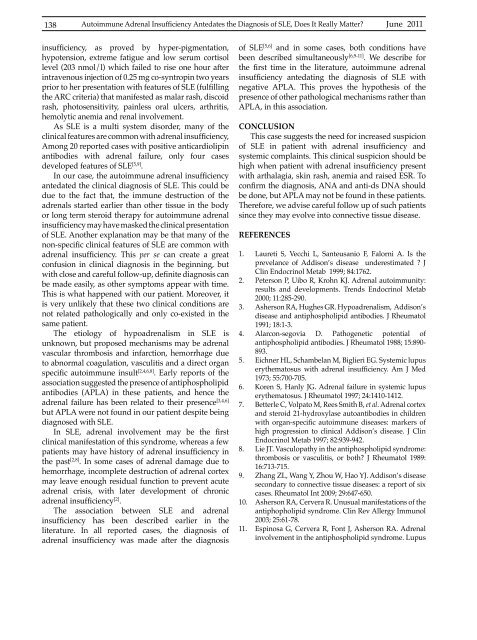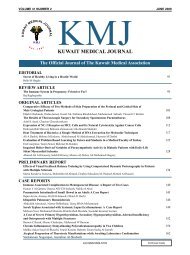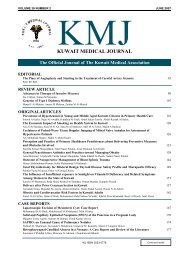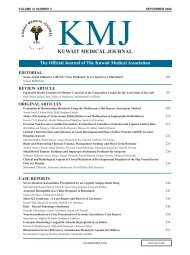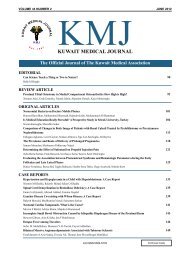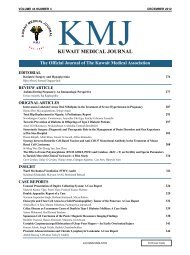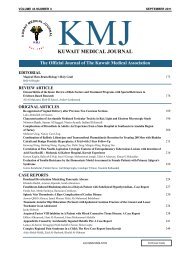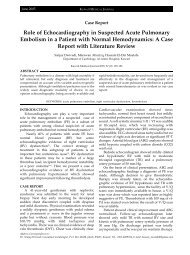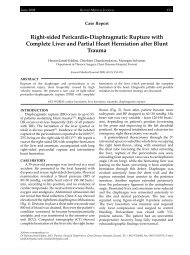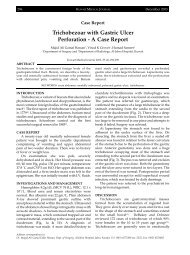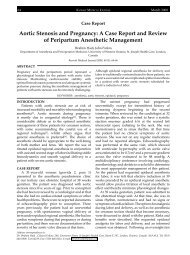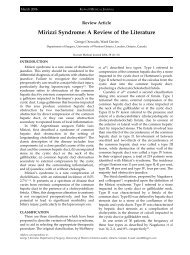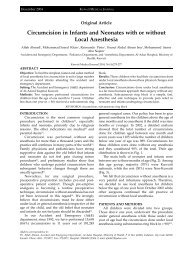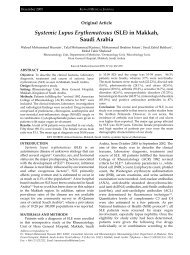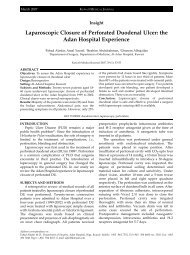Vol 43 # 2 June 2011 - Kma.org.kw
Vol 43 # 2 June 2011 - Kma.org.kw
Vol 43 # 2 June 2011 - Kma.org.kw
You also want an ePaper? Increase the reach of your titles
YUMPU automatically turns print PDFs into web optimized ePapers that Google loves.
138<br />
Autoimmune Adrenal Insufficiency Antedates the Diagnosis of SLE, Does It Really Matter<br />
<strong>June</strong> <strong>2011</strong><br />
insufficiency, as proved by hyper-pigmentation,<br />
hypotension, extreme fatigue and low serum cortisol<br />
level (203 nmol/l) which failed to rise one hour after<br />
intravenous injection of 0.25 mg co-syntropin two years<br />
prior to her presentation with features of SLE (fulfilling<br />
the ARC criteria) that manifested as malar rash, discoid<br />
rash, photosensitivity, painless oral ulcers, arthritis,<br />
hemolytic anemia and renal involvement.<br />
As SLE is a multi system disorder, many of the<br />
clinical features are common with adrenal insufficiency,<br />
Among 20 reported cases with positive anticardiolipin<br />
antibodies with adrenal failure, only four cases<br />
developed features of SLE [5,9] .<br />
In our case, the autoimmune adrenal insufficiency<br />
antedated the clinical diagnosis of SLE. This could be<br />
due to the fact that, the immune destruction of the<br />
adrenals started earlier than other tissue in the body<br />
or long term steroid therapy for autoimmune adrenal<br />
insufficiency may have masked the clinical presentation<br />
of SLE. Another explanation may be that many of the<br />
non-specific clinical features of SLE are common with<br />
adrenal insufficiency. This per se can create a great<br />
confusion in clinical diagnosis in the beginning, but<br />
with close and careful follow-up, definite diagnosis can<br />
be made easily, as other symptoms appear with time.<br />
This is what happened with our patient. Moreover, it<br />
is very unlikely that these two clinical conditions are<br />
not related pathologically and only co-existed in the<br />
same patient.<br />
The etiology of hypoadrenalism in SLE is<br />
unknown, but proposed mechanisms may be adrenal<br />
vascular thrombosis and infarction, hemorrhage due<br />
to abnormal coagulation, vasculitis and a direct <strong>org</strong>an<br />
specific autoimmune insult [2,4,6,8] . Early reports of the<br />
association suggested the presence of antiphospholipid<br />
antibodies (APLA) in these patients, and hence the<br />
adrenal failure has been related to their presence [3,4,6]<br />
but APLA were not found in our patient despite being<br />
diagnosed with SLE.<br />
In SLE, adrenal involvement may be the first<br />
clinical manifestation of this syndrome, whereas a few<br />
patients may have history of adrenal insufficiency in<br />
the past [2,8] . In some cases of adrenal damage due to<br />
hemorrhage, incomplete destruction of adrenal cortex<br />
may leave enough residual function to prevent acute<br />
adrenal crisis, with later development of chronic<br />
adrenal insufficiency [2] .<br />
The association between SLE and adrenal<br />
insufficiency has been described earlier in the<br />
literature. In all reported cases, the diagnosis of<br />
adrenal insufficiency was made after the diagnosis<br />
of SLE [5,6] and in some cases, both conditions have<br />
been described simultaneously [6,9-11] . We describe for<br />
the first time in the literature, autoimmune adrenal<br />
insufficiency antedating the diagnosis of SLE with<br />
negative APLA. This proves the hypothesis of the<br />
presence of other pathological mechanisms rather than<br />
APLA, in this association.<br />
CONCLUSION<br />
This case suggests the need for increased suspicion<br />
of SLE in patient with adrenal insufficiency and<br />
systemic complaints. This clinical suspicion should be<br />
high when patient with adrenal insufficiency present<br />
with arthalagia, skin rash, anemia and raised ESR. To<br />
confirm the diagnosis, ANA and anti-ds DNA should<br />
be done, but APLA may not be found in these patients.<br />
Therefore, we advise careful follow up of such patients<br />
since they may evolve into connective tissue disease.<br />
REFERENCES<br />
1. Laureti S, Vecchi L, Santeusanio F, Falorni A. Is the<br />
prevelance of Addison’s disease underestimated J<br />
Clin Endocrinol Metab 1999; 84:1762.<br />
2. Peterson P, Uibo R, Krohn KJ. Adrenal autoimmunity:<br />
results and developments. Trends Endocrinol Metab<br />
2000; 11:285-290.<br />
3. Asherson RA, Hughes GR. Hypoadrenalism, Addison’s<br />
disease and antiphospholipid antibodies. J Rheumatol<br />
1991; 18:1-3.<br />
4. Alarcon-segovia D. Pathogenetic potential of<br />
antiphospholipid antibodies. J Rheumatol 1988; 15:890-<br />
893.<br />
5. Eichner HL, Schambelan M, Biglieri EG. Systemic lupus<br />
erythematosus with adrenal insufficiency. Am J Med<br />
1973; 55:700-705.<br />
6. Koren S, Hanly JG. Adrenal failure in systemic lupus<br />
erythematosus. J Rheumatol 1997; 24:1410-1412.<br />
7. Betterle C, <strong>Vol</strong>pato M, Rees Smith B, et al. Adrenal cortex<br />
and steroid 21-hydroxylase autoantibodies in children<br />
with <strong>org</strong>an-specific autoimmune diseases: markers of<br />
high progression to clinical Addison’s disease. J Clin<br />
Endocrinol Metab 1997; 82:939-942.<br />
8. Lie JT. Vasculopathy in the antiphospholipid syndrome:<br />
thrombosis or vasculitis, or both J Rheumatol 1989:<br />
16:713-715.<br />
9. Zhang ZL, Wang Y, Zhou W, Hao YJ. Addison’s disease<br />
secondary to connective tissue diseases: a report of six<br />
cases. Rheumatol Int 2009; 29:647-650.<br />
10. Asherson RA, Cervera R. Unusual manifestations of the<br />
antiphopholipid syndrome. Clin Rev Allergy Immunol<br />
2003; 25:61-78.<br />
11. Espinosa G, Cervera R, Font J, Asherson RA. Adrenal<br />
involvement in the antiphospholipid syndrome. Lupus


